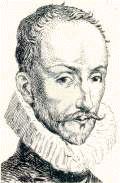Étienne Jodelle facts for kids
Étienne Jodelle, seigneur de Limodin (1532–July 1573) was a French dramatist and poet. He was born in Paris into a noble family. He became an important figure in French theater during his time.
Contents
A New Kind of Playwright
Étienne Jodelle joined a group of poets called the Pléiade. This group wanted to change French poetry and plays. Jodelle aimed to create plays that were like the old Greek and Roman dramas. This was very different from the popular plays of his time, which were often simple moral stories or funny skits.
His First Play: Cléopâtre captive
Jodelle's first play was called Cléopâtre captive (Cleopatra Captured). It was performed for the French court in 1552. Jodelle himself played the main role. His friends, including Remy Belleau and Jean Bastier de La Péruse, were also in the cast.
The play was a big success! To celebrate, Jodelle and his friends had a small party. They led a goat decorated with flowers in a procession and gave it to Jodelle. Some people who didn't like the Ronsardists (a group Jodelle was part of) made this celebration seem like a return to old pagan rituals.
Other Works
Jodelle wrote two other plays. One was a comedy called Eugène. This play made fun of important church leaders. It wasn't as popular as it should have been. Jodelle also wrote a tragedy called Didon se sacrifiant (Dido Sacrificing Herself). This play followed the story from the Roman poet Virgil. It seems this play was never actually performed.
Jodelle died in poverty in July 1573. His works were collected and published the year after he died.
Jodelle's Impact on French Theater
While Jodelle's plays might seem simple to us today, they were very important. For example, in Cléopâtre, not much action happens on stage. Instead, the characters talk a lot about their feelings and thoughts. Each act ends with a group of singers (a chorus) who talk about things like how luck can change or how pride can lead to downfall.
Even so, Cléopâtre was a huge step for French theater. It was the beginning of what we now call French classical tragedy. Other playwrights soon followed his lead, like Jean Bastier de La Péruse with his play Médée (1553). Jodelle was known for working quickly, but he also enjoyed having fun. His friend Ronsard believed that Jodelle's published poems didn't fully show how talented he was.
See also
 In Spanish: Étienne Jodelle para niños
In Spanish: Étienne Jodelle para niños
 | Claudette Colvin |
 | Myrlie Evers-Williams |
 | Alberta Odell Jones |


